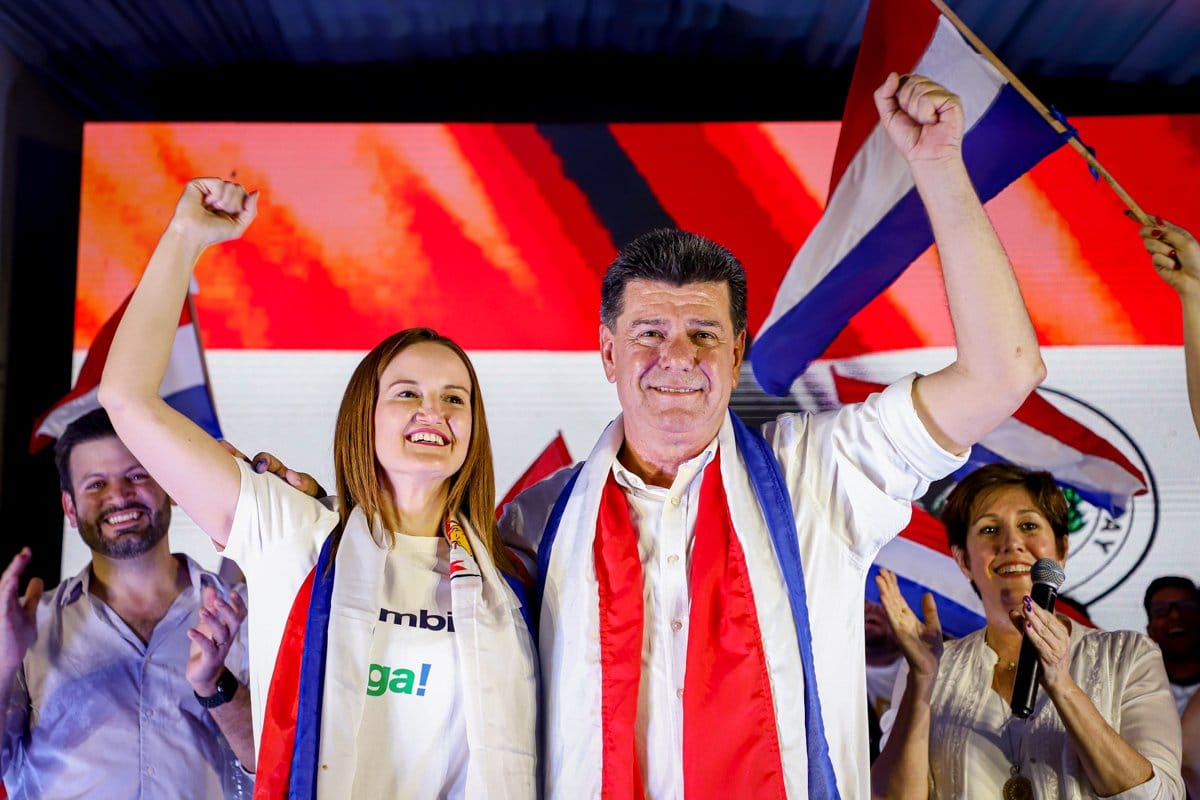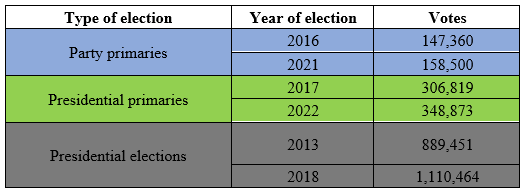
By Marcos Pérez Talia
Last Sunday, December 18, the elections of the opposition, or Concertación, were held with an open electoral roll. It was an unprecedented event in the Paraguayan democratic history since any voter, regardless of his affiliation, could vote for the different formulas for the Executive power. A couple of hours after the closing of the election, the ample triumph of the Efrain Alegre and Soledad Nuñez formula was confirmed. A tireless agenda added to a series of crucial events consolidated Alegre’s validity and led him to position himself, for the third time, as the main opposition presidential candidate.
Efraín was presidential candidate twice before, in 2013 and 2018. In the first one, he was defeated by Cartes, by a difference of eight points. The breakup of the successful Patriotic Alliance for Change, after the impeachment of Lugo in 2012, was decisive for the colorado triumph. In 2018 Alegre managed to recompose the alliance formula with the left, and accompanied by Leo Rubín, was again defeated by Mario Abdo by 3%, the smallest margin of the democratic era. However, the (little) transparency of those elections and the collusion of the media that flooded the campaign with grossly false polls left more doubts than certainties. His second presidential defeat, in a far from transparent electoral process, far from burying Alegre’s political career, revitalized it.
A year after Mario Abdo took office as president, a scandal arose that almost cost him the Presidency. His government negotiated a secret agreement with Brazil that was detrimental to Paraguayan interests in the Itaipu hydroelectric power plant. As soon as this was known, an impeachment trial began, initially with the support of the Cartista congress (which ensured the votes for the presidential impeachment), although in extremis it was saved by the leader of the faction, Horacio Cartes. Alegre’s main agenda at the time was energy policy, and this scandal placed him at the center of the political storm. According to a lower house member, his faction prevented the impeachment trial, not to save Mario Abdo, but because if new elections were held (due to the presidential acephaly) Efraín Alegre would win.
In January 2021, in the middle of the pandemic and still without vaccines, the justice system ordered the imprisonment of Efraín Alegre. It was a court case as absurd as it was illegal, a product of the accountability of the 2018 political campaign. In the face of the immense criticism of opposition leaders and some media, justice ordered his release weeks later, although the judicial process continues its cause. His imprisonment revalued the meaning of his struggle, strengthening his cause. In a way, it validated his story that there is a country co-opted by the mafia, which subjugated its institutions, and that fiercely punishes those who oppose it.
A few months later, in June 2021, the PLRA was going through primaries to elect party authorities. Alegre chose to seek the reelection, and his main rival was Salyn Buzarquis, who narrowed a broad anti-Efrainist alliance that included almost all the Liberal parliamentarians, plus the llanismo and the team of Víctor Ríos. Despite the electoral strength of his contender, Efrain managed to be reelected president of the party. With this, he took another huge step towards 2023, with the support of his loyal Liberal electorate.
Alegre’s next challenge was to create a space for the convergence of most of the opposition. He proposed the use of the figure of the Concertación, which had not been used until then. The convention of his party approved, and, at the same time, he started negotiations with the opposition forces to join the space. In June the different forces -including the Frente Guasú- signed the Concertación agreement.
To ensure incentives for the other forces to dispute the Concertación’s internal elections, he promoted the use of the national electoral roll so that all voters (whether or not they were affiliated to a party) could vote. Despite the fact that his adversaries pointed out that it was not convenient for Efraín to leave the margins of the liberal electoral roll (due to its supposed erosion in the independent electorate), he campaigned with the new ministers of the TSJE for its approval, which finally happened and was celebrated with enthusiasm.
It seems very clear that Efraín Alegre’s leadership is in full growth. His electoral numbers are increasing in each election, process after process
Although Alegre was reelected president of the PLRA, the margin with which he won -34%- did not assure him an easy victory against the other opposition formulas. He then began a process of internal reorganization to improve his correlation of forces. In a short time, he obtained the support for the presidential elections of his former rivals such as Salyn Buzarquis (his opponent in the internal party elections of 2016 and 2021), Paková Ledesma, Alejo Ríos (governor of Caaguazú), the political team of Víctor Ríos (today in the Supreme Court), and multiple mayors, councilors and lower house congressmen who previously belonged to the movement of Dionisio Amarilla. In addition, outside the strictly liberal vote, he reached an agreement for the presidential campaign with Soledad Núñez and the Alianza Encuentro Nacional. In addition, he obtained the support of Miguel Prieto and all his political team in Alto Paraná.
These different events and the successful internal and external articulation carried out up to this point once again bore fruit. Thus, Efraín Alegre easily won in the Concertación with 59.2% of the votes, against Hugo Fleitas with 17%, Martín Burt with 12.5% and Sebastián Villarejo with 4.7%.
Figure I. Number of votes of the main presidential candidates of the Concertación (2022)

Source: https://resultados.tsje.gov.py/publicacion/divulgacion.html
The above graph shows the important difference in votes between the main candidates that competed for the presidency. The use of the national electoral roll -and not only the liberal one- was not a problem for Alegre to win very comfortably against the different opposing expressions. The arrival of the independent vote to the internal election, far from generating uncertainty, consolidated his chances, favored, in addition, by his alliance with Soledad Núñez.
It seems very clear that Efraín Alegre’s leadership is in full growth. His electoral numbers are increasing in each election, process after process, as shown in the following table:
Table I. Votes obtained by Efraín Alegre in the different elections (2013 to 2022)

Source: Statistical data obtained from PLRA and TSJE.
His electoral base is growing, as shown in the table above. For these 2023 general elections, his candidacy will be supported by Soledad Núñez and the Concertación in general, which seems to be a crucial key for a possible alternation in 2023.
Cover image: Efraín Alegre’s social networks
